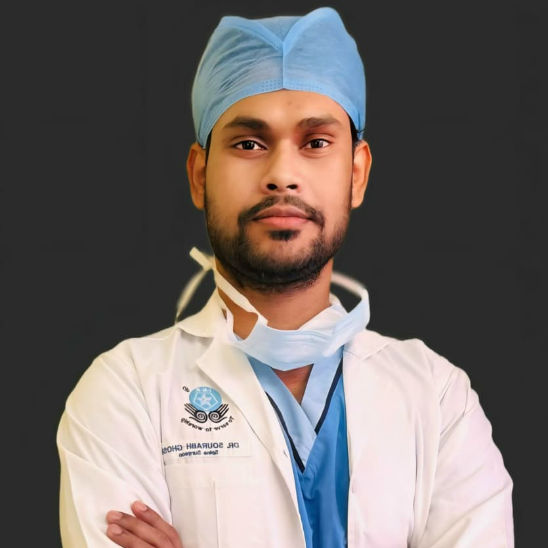Information on Paget's Disease of Bone
Paget’s disease of bone affects how bones grow and repair, leading to pain, deformities, or fractures. Learn about its symptoms, causes, complications, and treatment options for better bone health.

Written by Dr. Dhankecha Mayank Dineshbhai
Reviewed by Dr. Md Yusuf Shareef MBBS
Last updated on 13th Jan, 2026

Paget’s disease of bone is a chronic condition affecting how your bones grow and repair themselves. While it may sound intimidating, understanding the disease can help you manage it better. This guide will walk you through the basics—what it is, its symptoms, causes, and how to live well with it.
What is Paget’s Disease of Bone?
Paget’s disease disrupts the normal process of bone remodelling—how your body breaks down old bone and replaces it with new bone tissue. In this condition, the new bone forms too quickly, making it weaker and more prone to deformities, fractures, or pain.
It usually affects one or a few bones rather than the entire skeleton. Common sites include the pelvis, spine, skull, and legs. While it can occur at any age, it’s more common in people over 50.
Symptoms of Paget’s Disease
Many people with Paget’s disease don’t experience symptoms, especially in the early stages. When symptoms do appear, they may include:
- Bone pain (often dull and persistent)
- Joint stiffness or swelling
- Enlarged or misshapen bones (e.g., bowed legs or an enlarged skull)
- Fractures (due to weakened bones)
- Nerve compression (leading to tingling, numbness, or weakness if bones press on nerves)
- Hearing loss (if the skull is affected)
If you notice any of these symptoms, it’s best to consult a doctor for proper evaluation.
What Causes Paget’s Disease?
The exact cause is still unclear, but researchers believe a combination of genetic and environmental factors plays a role:
- Genetics: If a close family member has Paget’s disease, you may be at higher risk.
- Viral infections: Some studies suggest a possible link to viral infections in bone cells.
- Age & gender: It’s more common in older adults and slightly more prevalent in men.
How Does Paget’s Disease Affect Health?
If left untreated, Paget’s disease can lead to complications such as:
- Osteoarthritis (due to abnormal bone growth near joints)
- Bone fractures (weakened bones break more easily)
- Nerve damage (if enlarged bones compress nerves)
- Heart problems (rarely, increased blood flow to affected bones can strain the heart)
- The good news? Early diagnosis and treatment can help prevent these complications.
Managing Paget’s Disease: Tips for Better Bone Health
- While there’s no cure for Paget’s disease, treatments and lifestyle changes can help manage symptoms and slow progression.
Consult an Orthopaediatrist for Personalised Advice
Medical Treatments
- Bisphosphonates: These medications help regulate bone remodelling and reduce pain.
- Pain relievers: Over-the-counter painkillers (like acetaminophen or NSAIDs) may help with discomfort.
- Surgery: Rarely needed, but may be required for fractures, severe joint damage, or nerve compression.
Lifestyle & Dietary Tips
- Calcium & Vitamin D: Strong bones need these nutrients. Include dairy, leafy greens, and fortified foods in your diet.
- Regular exercise: Weight-bearing activities (walking, light strength training) help maintain bone strength.
- Fall prevention: Since bones are fragile, avoid tripping hazards and use assistive devices if needed.
- Regular check-ups: Monitoring bone health helps catch complications early.
When to See a Doctor?
If you experience persistent bone pain, unexplained fractures, or deformities, consult a specialist. Early diagnosis can make a big difference in managing the disease effectively.
Need Expert Advice?
If you suspect Paget’s disease or need guidance, consider booking a consultation with an orthopaedic specialist through Apollo 24|7. Early intervention can help you stay active and pain-free.
Final Thoughts
Living with Paget’s disease may require some adjustments, but with the right care, you can maintain a good quality of life. Stay informed, follow your doctor’s advice, and take steps to keep your bones as healthy as possible.
Remember, you’re not alone—medical support is always available to help you navigate this condition with confidence.
Consult an Orthopaediatrist for Personalised Advice
Consult an Orthopaediatrist for Personalised Advice

Dr. Deepthi K N
Orthopaedician
6 Years • MBBS, Diploma in Orthopaedics , DNB Orthopaedics
Bengaluru
Apollo Hospitals Jayanagar, Bengaluru

Dr. Arun Kumar Ramanathan
Orthopaedician
25 Years • MBBS, MS (ortho), MCh (ortho) (UK) , MRCS (UK) , MD (Research) (UK) - Excellent orthopaedic (bone and joint) surgeon with a special interest in Foot and Ankle surgery, minimally invasive and keyhole (arthroscopy) surgery, joint (hip/knee) replacement and reconstructive surgery.
Chennai
Apollo Speciality Hospitals OMR, Chennai
(50+ Patients)

Dr. Rupam Chowdhury
Orthopaedician
10 Years • MBBS, DNB (Ortho.)
Kolkata
MCR SUPER SPECIALITY POLY CLINIC & PATHOLOGY, Kolkata

Dr. Sourabh Ghosh
Orthopaedician
4 Years • MBBS, MS (Orthopaedics), Fellowship in Spine Surgery
East Midnapore
VIVEKANANDA SEBA SADAN, East Midnapore

Dr. Shrinidhi I S
Orthopaedician
8 Years • MBBS, D Ortho, DNB(Ortho), MNAMS
Bangalore
Apollo Clinic Bellandur, Bangalore
Consult an Orthopaediatrist for Personalised Advice

Dr. Deepthi K N
Orthopaedician
6 Years • MBBS, Diploma in Orthopaedics , DNB Orthopaedics
Bengaluru
Apollo Hospitals Jayanagar, Bengaluru

Dr. Arun Kumar Ramanathan
Orthopaedician
25 Years • MBBS, MS (ortho), MCh (ortho) (UK) , MRCS (UK) , MD (Research) (UK) - Excellent orthopaedic (bone and joint) surgeon with a special interest in Foot and Ankle surgery, minimally invasive and keyhole (arthroscopy) surgery, joint (hip/knee) replacement and reconstructive surgery.
Chennai
Apollo Speciality Hospitals OMR, Chennai
(50+ Patients)

Dr. Rupam Chowdhury
Orthopaedician
10 Years • MBBS, DNB (Ortho.)
Kolkata
MCR SUPER SPECIALITY POLY CLINIC & PATHOLOGY, Kolkata

Dr. Sourabh Ghosh
Orthopaedician
4 Years • MBBS, MS (Orthopaedics), Fellowship in Spine Surgery
East Midnapore
VIVEKANANDA SEBA SADAN, East Midnapore

Dr. Shrinidhi I S
Orthopaedician
8 Years • MBBS, D Ortho, DNB(Ortho), MNAMS
Bangalore
Apollo Clinic Bellandur, Bangalore